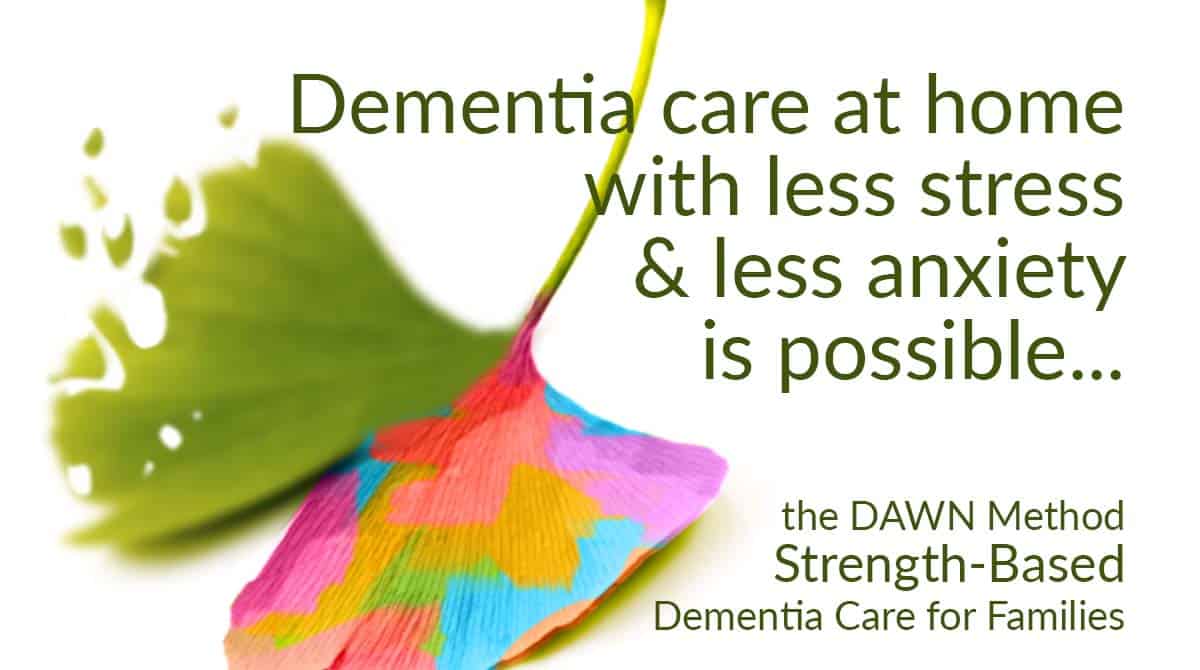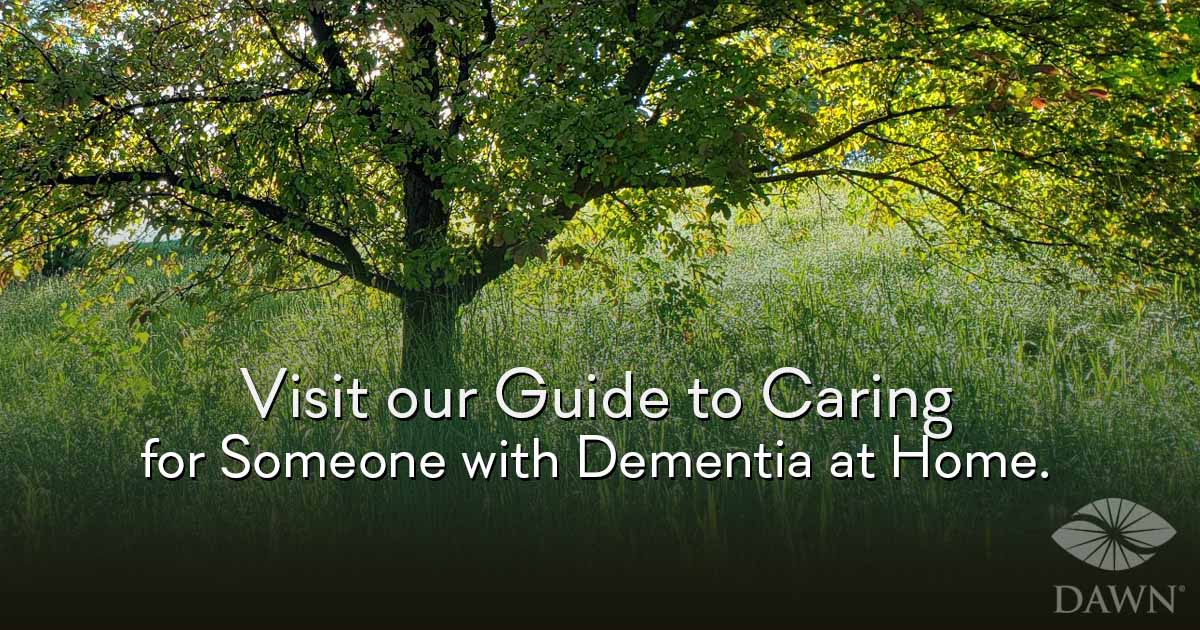We are affecting the moods of those experiencing dementia
When we are with people who are experiencing dementia (or Alzheimer’s), we may not realize it, but our moods are shaping theirs. It may seem to be sudden moodiness or mood swings or volatility, but because dementia takes away the ability to manage our own moods, people become extremely susceptible to their companions’ moods—and to whatever their companion’s face or body language might be communicating.
Understanding how we, as human beings, manage our own moods will dramatically increase your peace and companionship if you spend time with someone who is experiencing dementia. And, understanding the impact of nonverbal communication on mood changes in dementia will give you the ability to be proactive and create positive moods. Let me explain.
How we normally manage our moods
We generally believe that people are responsible for managing their own moods, and when someone claims that another person is responsible for how they feel, we suggest they take responsibility for their own feelings. This is because we are equipped to recognize and manage our own moods using our memory skills and rational thinking skills.

Think about how you manage your moods. If you are feeling sad or restless, you might use your memory skills to recall something fun that you’ve done before and could do again, or you might use your rational thinking skills to plan an activity that will lift your spirits. If you are feeling frustrated or hurt by something someone said, you might think back to recent events and recall reasons for why they said what they did, and begin feeling understanding or forgiveness instead. If you are feeling bored or unhappy, or at risk, you might use your rational thinking skills to plan a treat for later, distract yourself with thoughts of an upcoming event or vacation, or come up with a plan to make yourself feel safe again.
Why dementia affects our moods
However, dementia takes away the very skills we normally use to manage mood: our memory skills and rational thinking skills. These are the same skills we use to help ourselves feel safe and comfortable. (We also lose some attention skills, but that’s another topic; for more detail on the skills we lose to dementia, you might visit you might visit “Skills Kept and Lost to Dementia” from our Dementia Roadmap.)
When we lose our memory skills, we become unable to look at our surroundings and remember how we got there, to recognize even the most familiar items, or to recall what happened or was said just moments ago. When we lose our rational thinking skills, we become unable to make plans or see the steps needed to solve a problem that’s causing us unease or discomfort. These losses set us up to feel anxious, uncomfortable and unsafe. We need our companions to recognize our new needs and nonjudgmentally answer our questions.
But losing our memory and rational thinking skills also makes us unable to interpret our companions’ nonverbal cues (their facial expressions, body language and tone of voice). Think about what that means: we do not lose the ability to read our companions’ nonverbal cues, only the ability to interpret them. The result is that whatever cues our companions give us, we will take them at face value. We take everything their nonverbal communication tells us personally—and we can’t help it.

Mary’s story: an example of mood mismanagement
One of our clients, Mary, had two DAWN care partners as well as a daughter who lived nearby. All three women were kind, empathetic and very much attached to Mary. One day, one caregiver called me saying that Mary was having trouble with both pain and insecurity, and now needed someone to move in with her as her overnight caregiver. She said that lately Mary had been complaining of pain almost every time she was with her and, when she prepared to leave, Mary would become anxious and beg her to stay the night.
I told the caregiver that I would revise Mary’s care plan and we’d have someone begin staying overnight immediately. However, when I spoke with Mary’s daughter, she was mystified. I talked with the other caregiver and she was surprised, too. They both said that when they were with Mary, she had no pain and still adamantly refused to have anyone stay over at night.
I realized that Mary was responding to her companions’ moods. All three women were loving and empathetic, but the first caregiver was communicating her concern to Mary through her nonverbal cues, particularly as her shifts drew to a close. Mary easily read that concern and, without the ability to interpret it, assumed there was something to be concerned and worried about. She then became anxious and tense, so her aches and pains became more pronounced—and she didn’t want to be alone.
I have watched loving and concerned family members do the same thing. They come to visit their loved one but bring their own sadness, guilt and loss. We watch their loved one absorb their pain and become filled with it. Then, the family leaves and we go back to filling our client’s presence with love and joy, and they revert back to the sunny, relaxed disposition we see normally.
We need to consciously shape our nonverbal communication
If you spend time with someone who’s experiencing dementia, whether you realize it or not, you are shaping their moods—and they do not have the skills to prevent it from happening. Only you can bring comfort and peace and a sense that all is okay. That isn’t something they can do on their own. Whatever mood you bring into their presence will be the mood they begin to feel. And whatever your (often-unconscious) body language, facial expression and tone of voice is communicating, they will take personally and won’t be able to avoid doing so.
People who are experiencing dementia lose the ability to improve or create their own positive moods, as well as the ability to analyze why their companions appear to be feeling the way they do. If you spend time with someone who’s experiencing dementia, whatever you bring into their presence will be absorbed and mirrored back to you. We need to use our own memory skills and rational thinking skills to put aside our own worries—and any we might have about their situation—and come to them with joy and love instead.
§

FAQs about Alzheimer’s and mood swings
What causes mood swings in Alzheimer’s disease and dementia?
The short answer is that you may be inadvertently causing mood swings if your loved one is experiencing Alzheimer’s disease or dementia. When a person is experiencing dementia, they lose the ability to manage their own moods because they lose their memory skills and rational thinking skills. Worse, those are also the skills needed to interpret or understand why someone else might look unhappy or seem distant, so they cannot help but take your moods personally. If you look worried, they will become worried. As a companion, you need to be aware of this and use your nonverbal cues to communicate a positive mood. Whatever your face or voice communicates is the mood they will mirror back to you. And it will be absorbed and shared long after you’ve left the room.

